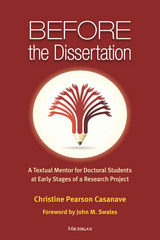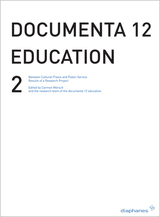
“This very readable book is what every graduate student needs as they start a program. I wish my own MA and PhD students, during my 40 years of supervising, could have been demystified by having Casanave's ‘textual mentor' as a companion."
--Merrill Swain, Professor Emerita, OISE, University of Toronto
“Before the Dissertation is an insightful, relevant, and accessible resource for doctoral students at any stage. Full of reflections and advice not found in other books, it serves as an indispensable guide for students and their supervisors. And the dispelling of myths is a superb idea!”
--Robert Kohls, PhD candidate, University of Toronto
Before the Dissertation speaks to an audience in the social sciences, but in particular to doctoral students who have experience with and interest in international, multilingual, as well as native English speaking students and settings and who wish to investigate topics in (second) language and multicultural-transcultural education. Athough appropriate for use in English-dominant doctoral programs throughout the world, the book will relate more closely to students in the North American educational system than to ones, for example, in the British system. The main audience for this book is thus doctoral students who are first or second/additional users of English, who are interested in pursuing topics in one of the social sciences, including education and multilingual inquiry, and who may just be finishing course work in an English-dominant university and are wondering what might happen next.

Education is situated in tension between public sphere and institution, amateur and professional, artist and audience. Its development needs felicitous examples as well as rigor in discussing problems towards identifying practical solutions.
»documenta 12 education« presents in two illustrated volumes the education formats with concomitant research, providing a basis for developing theory and praxis of gallery education.
These volumes are an ideal resource for people working in the fields of curating exhibitions, gallery education, youth work and cultural policy. People less familiar with cultural work will find in these books a valuable introduction to the field of gallery education.
Volume 2 focuses on a theory of gallery education, its methods and contexts, and reflects theoretically on examples presented in Volume 1. It is addressed to professionals from the field of gallery education, cultural education and formal education.
READERS
Browse our collection.
PUBLISHERS
See BiblioVault's publisher services.
STUDENT SERVICES
Files for college accessibility offices.
UChicago Accessibility Resources
home | accessibility | search | about | contact us
BiblioVault ® 2001 - 2024
The University of Chicago Press









